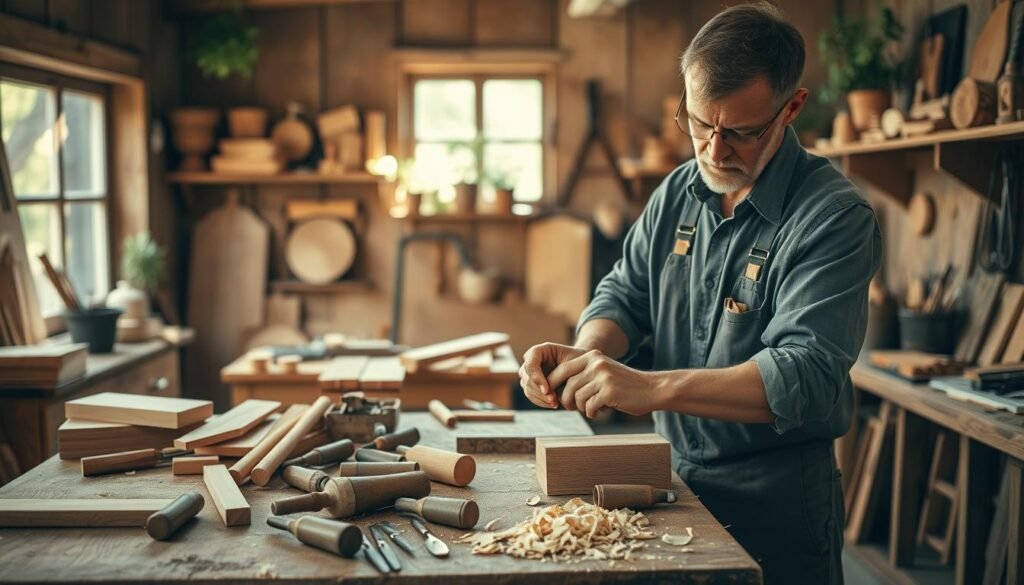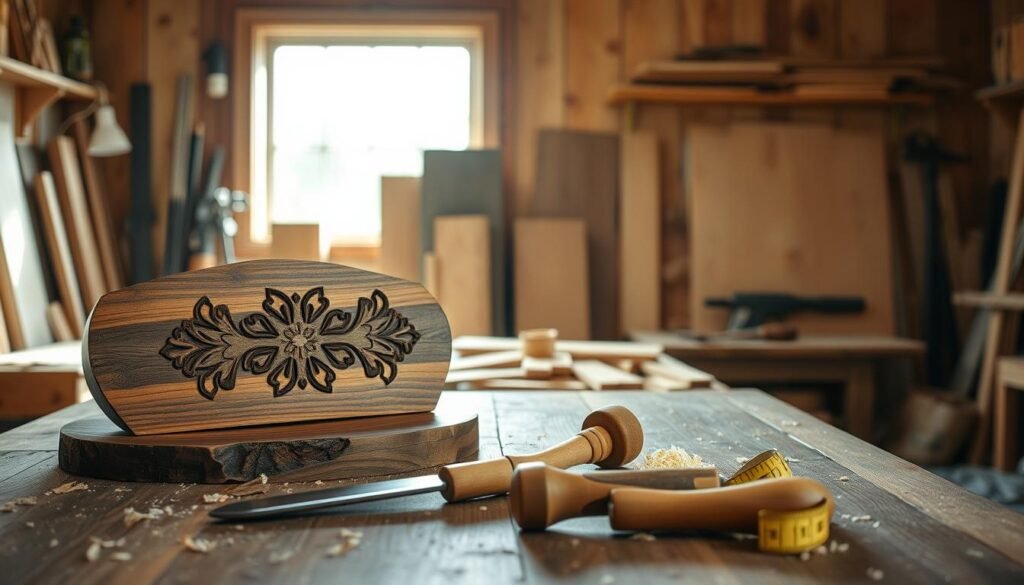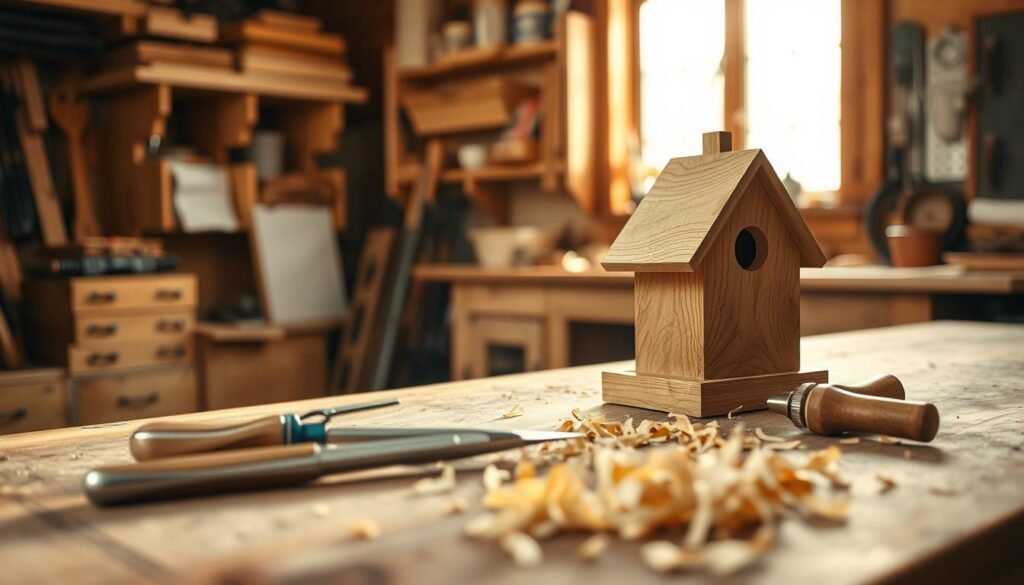Creating something with your own hands is very rewarding. If you like working with wood and DIY, making a piece of furniture is a great start. It’s perfect for the living room.
A rustic furniture project like a wooden coffee table brings warmth and character to any home. This guide will help you make a unique DIY coffee table that you’ll love. It’s easy to follow, making it perfect for beginners.
By following this guide, you can build your own rustic coffee table. It’s a great addition to your living room. The steps are simple, making it a great wooden coffee table designs project for beginners.
Why Building Your Own Coffee Table Is Worth It
Creating a custom coffee table lets you match it perfectly to your space and style. It’s a rewarding DIY project that saves money and brings satisfaction. You get to make something with your own hands.
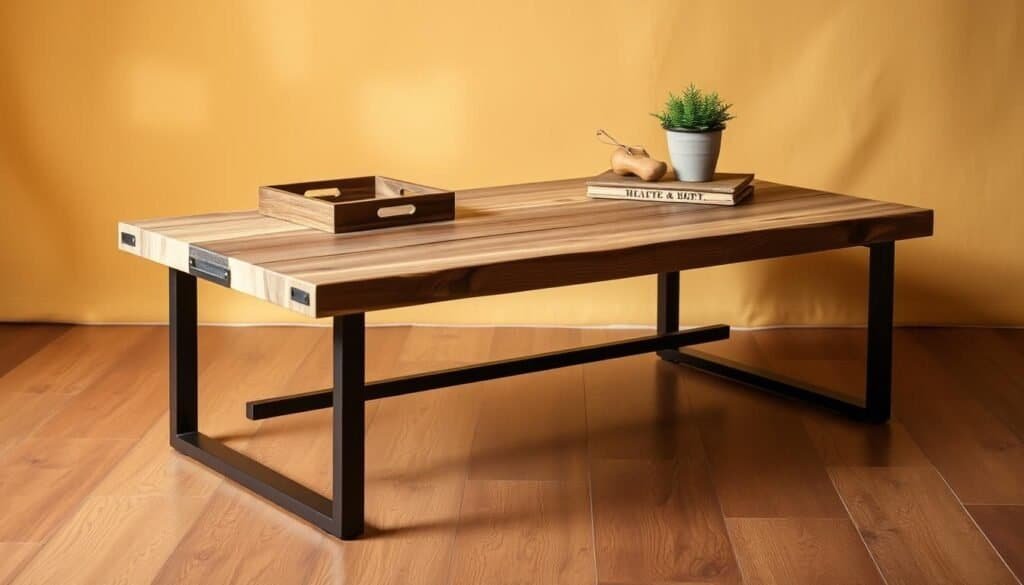
A handmade coffee table tutorial can help you avoid mistakes and get great results. This project adds a personal touch to your living room. It’s more than just furniture; it’s a piece of you.
The final result is a coffee table that shows off your taste and fits your home decor. Whether you want something modern or rustic, you can make it happen. It’s your chance to bring your vision to life.
Building your own coffee table is a unique and meaningful investment. It’s worth the effort because it’s truly yours.
Build Your Own Rustic Coffee Table: A Project You’ll Be Proud Of
Building a coffee table from scratch is rewarding. It lets you customize every part. With a step-by-step guide, you can make a beautiful piece that shows your style.
To start, gather materials and tools. For a rustic look, use reclaimed or distressed wood. A live edge coffee table adds a unique touch. Make sure you have a solid design before you begin.
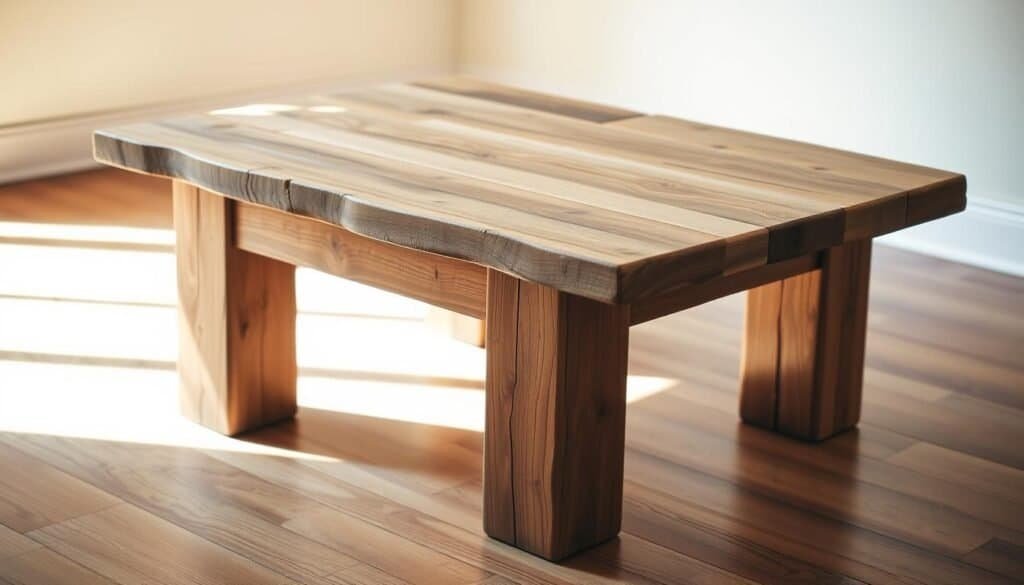
Following diy furniture plans makes things easier. These plans have detailed instructions and lists of materials. They help you stay on track, whether you’re experienced or new to DIY.
Remember, patience and detail are key as you work. Building a rustic coffee table is more than making furniture. It’s about creating a home centerpiece you’ll be proud of for years.
Essential Tools for Your DIY Coffee Table Project
Starting a DIY wooden coffee table project means you need the right tools. The right tools make the job easier and ensure a great finish. For your wood living room table, you’ll need some key tools to begin.
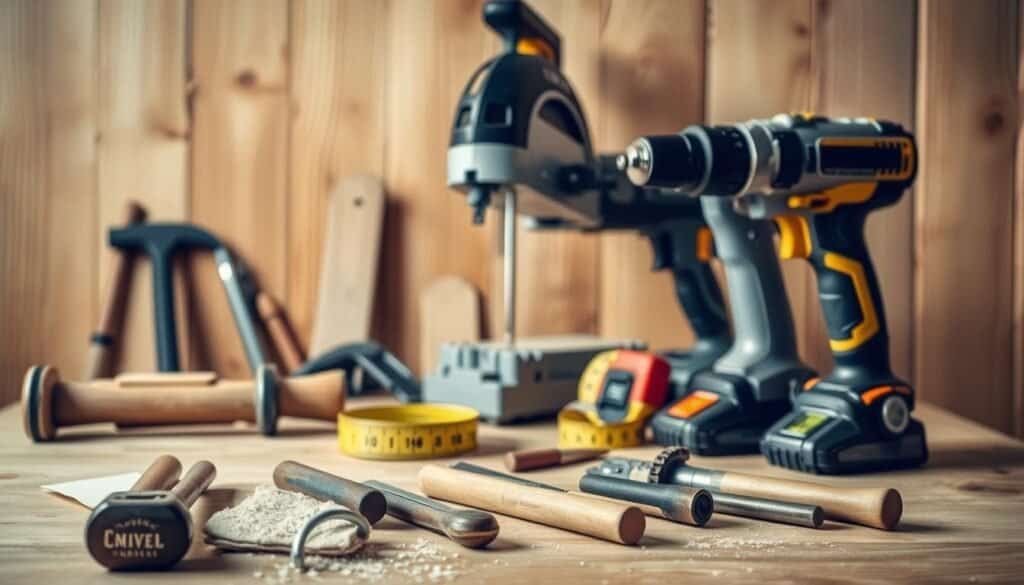
A drill is a must for any DIY project, like coffee tables. It’s used for making holes for screws. An impact driver is for driving big screws or tightening parts. Knowing how to use these tools is key for success.
Drill and Impact Driver Basics
For beginners, learning to use a drill and impact driver is important. Start by getting to know the parts of these tools. Practice on scrap wood before working on your coffee table project.
Saw Options for Beginners
When cutting wood for your coffee table, you have choices. A circular saw is best for straight cuts, and a jigsaw for curves. Beginners should start with a circular saw. It’s versatile and easy to use.
With the right tools and some knowledge, you can make a beautiful DIY coffee table. It will show off your skills and be functional too.
Selecting the Perfect Wood for Your Rustic Table
Choosing the right wood is key for a rustic coffee table. The wood you pick affects the table’s look and how long it lasts.
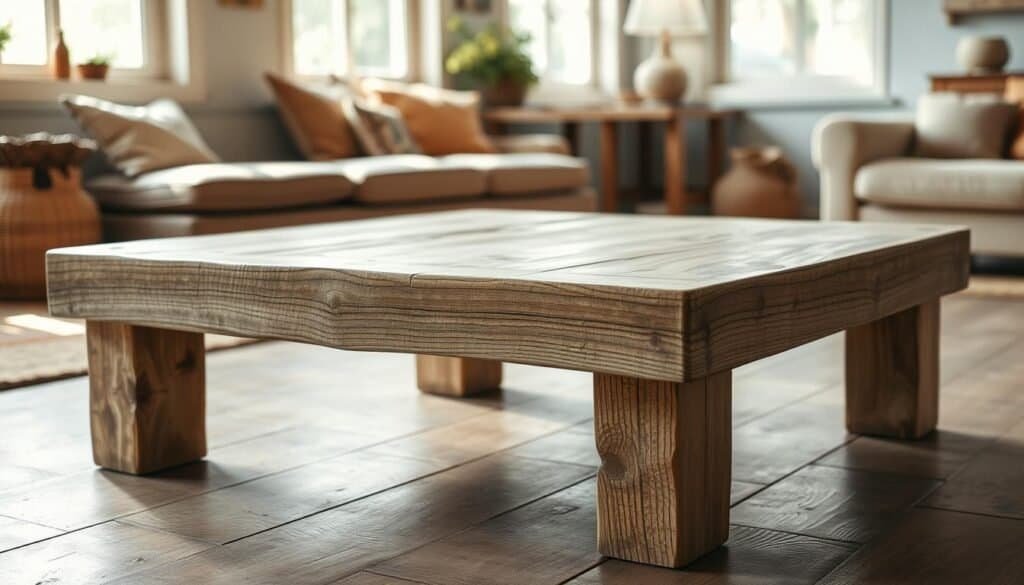
There are many woods to choose from for a rustic coffee table. Each has its own special qualities. Let’s look at some popular ones.
Pine: The Beginner-Friendly Option
Pine is a softwood that’s easy to work with. It’s great for beginners because it’s cheap and can be stained to look like more expensive woods. But, it’s not as strong as hardwoods.
Oak, Walnut, and Other Hardwoods
Hardwoods like oak and walnut are strong and have beautiful patterns. They can make your rustic coffee table look fancy. They’re harder to work with and cost more, but they’re worth it.
Reclaimed Wood Considerations
Reclaimed wood gives your table a unique, weathered look. It’s good for the planet and has a story to tell. But, it needs extra prep and can be pricey.
The best wood for your table depends on your budget, skill, and taste. Think about these things and the wood’s qualities to make a table that fits your home.
Whether you want a simple or modern table, picking the right wood is key. It helps you bring your vision to life.
Materials Shopping List and Budget Breakdown
Before you go to the hardware store, make a detailed list of materials and their costs. This helps you stay on budget and ensures you have everything needed for the project.
For a basic rustic coffee table, you’ll need wood for the top and shelves, legs, screws, glue, sandpaper, and a finish. The cost varies based on the wood type and table size. For example, using reclaimed wood for a modern design can be pricier than regular lumber.
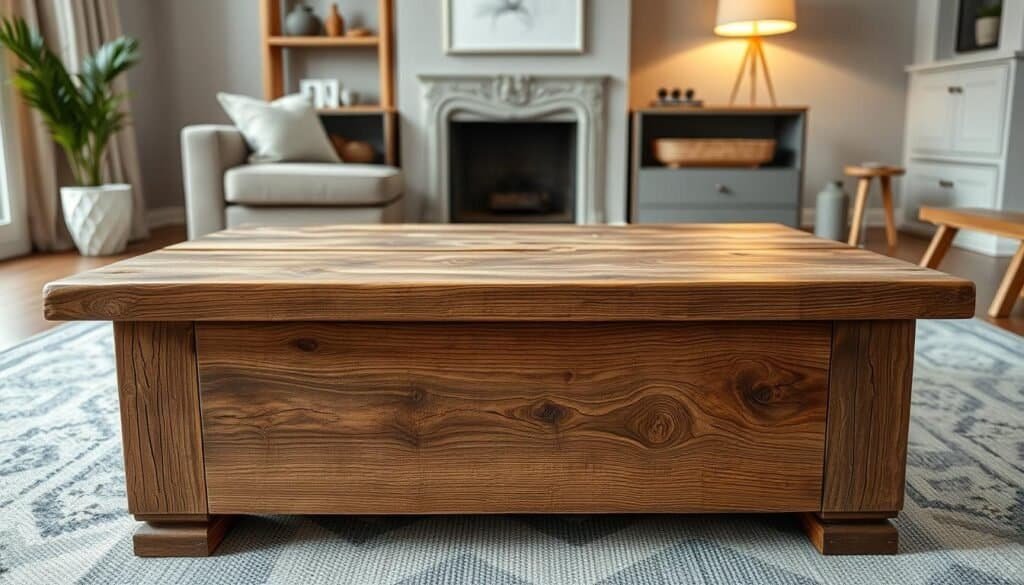
When planning your living room table, think about the cost of interior items too. These can include decorative vases or lamps. A well-chosen coffee table can be the room’s centerpiece, surrounded by other items.
Here’s a rough estimate of costs:
| Material | Estimated Cost |
|---|---|
| Wood for table top and shelves | $100-$300 |
| Legs and support structure | $50-$100 |
| Wood screws, glue, sandpaper | $20-$50 |
| Finish (stain, paint, varnish) | $20-$50 |
The total cost for a project like this can be between $200 and $500, depending on your choices.
Planning Your Coffee Table Design
Planning your coffee table’s design is key. It should match your style and the room’s decor. A well-chosen coffee table can be the room’s centerpiece, fitting perfectly with your sofa and other furniture.
There are many styles to pick from when designing your coffee table. Let’s look at a few popular ones:
Farmhouse Style
Farmhouse style coffee tables are rustic and simple. They have wooden tops and strong legs. This creates a cozy feel in your living room.
Industrial Rustic
Industrial rustic designs mix rough reclaimed wood with metal legs. It’s great for those who like a modern look with a bit of edge.
Live Edge Options
Live edge designs are truly unique. They have wooden tops with their natural edges. This style is perfect for those who love natural wood and want a coffee table that’s different.
Whether you prefer a circular, ottoman, or traditional rectangular table, choose one that shows your personality. It should also match your other furniture.
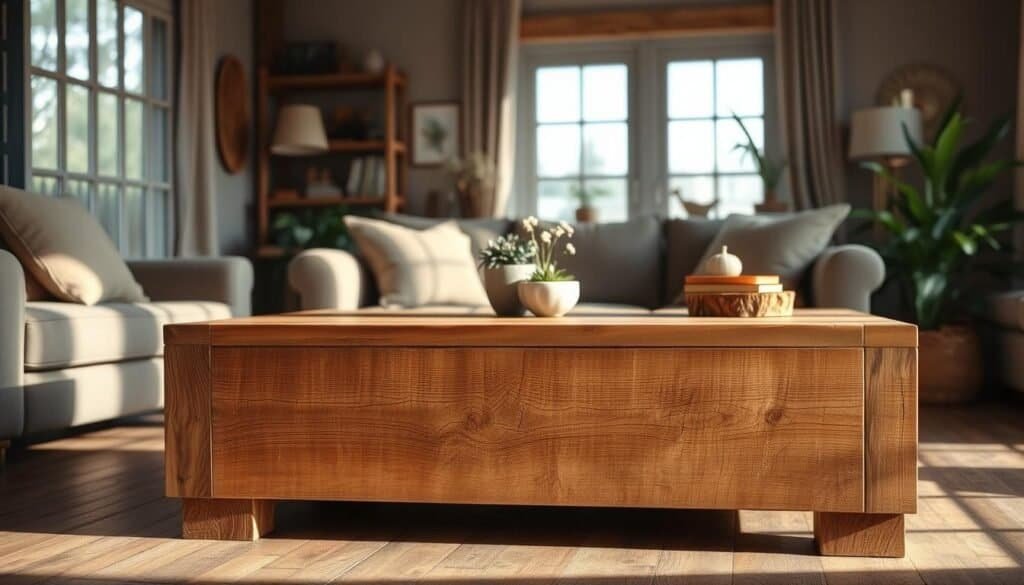
By carefully choosing and planning your design, you can get a coffee table that’s both useful and beautiful. It will make your living room even more welcoming.
Preparing Your Workspace for the Project
Getting your workspace ready is key to a successful DIY coffee table project. A clean area boosts your productivity and keeps you safe from accidents.
Begin by clearing a spot just for your project. Make sure it’s bright and has enough room for your tools and materials. Having everything close by makes your work easier when building a natural wood coffee table.
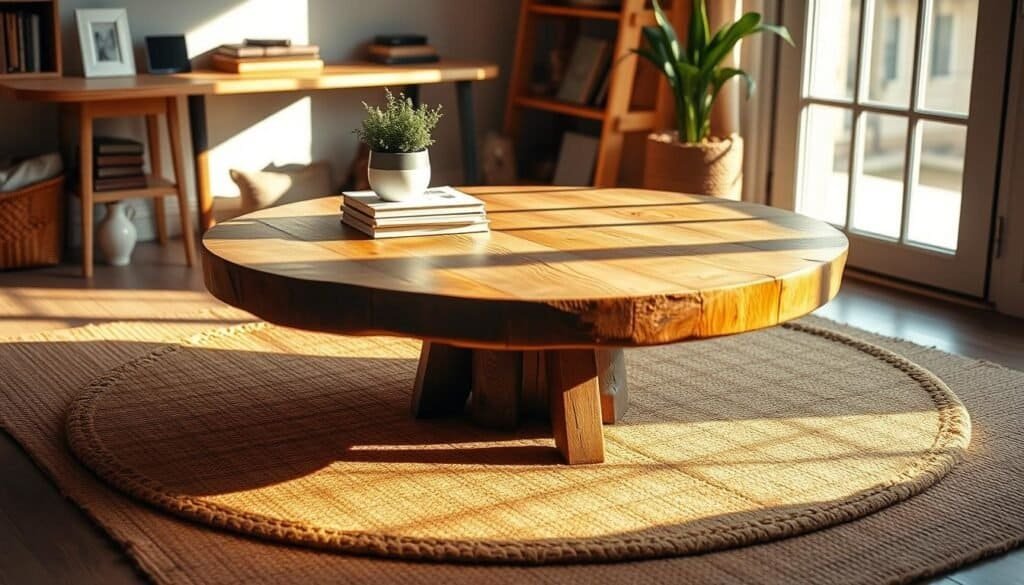
Think about the design you want, like a simple round coffee table decor or a more detailed round coffee table styling. A clear plan keeps you focused and organized.
With a well-prepared workspace, you’re on your way to making a stunning round wooden coffee table. It will be the highlight of your living room.
Step-by-Step Table Top Construction
Creating a sturdy and beautiful table top is a rewarding project. It requires careful attention and the right techniques.
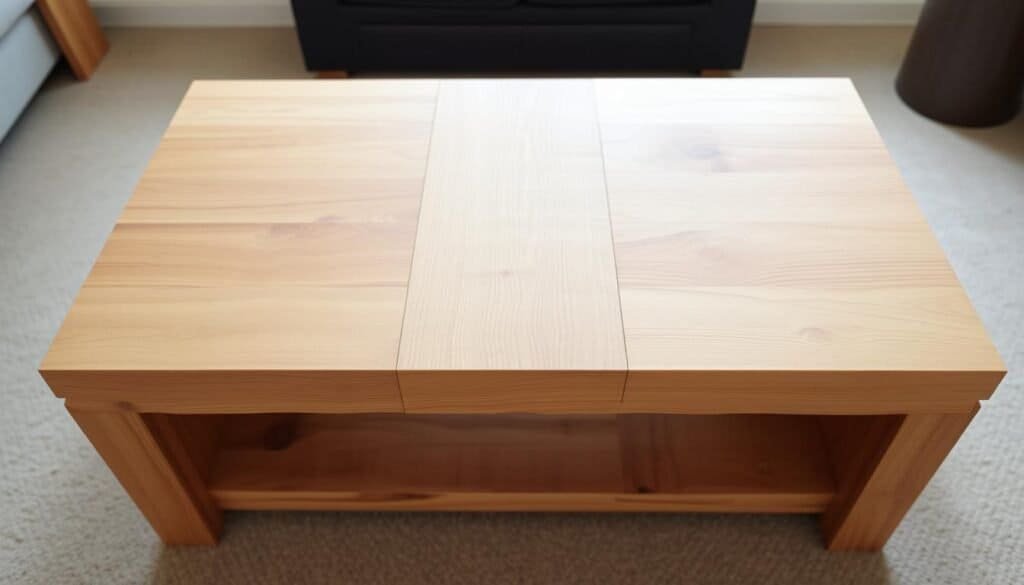
Accurate measurements are key to a successful table top. Use a tape measure and pencil to mark the wood. Double-check your measurements to avoid mistakes.
Making Straight Cuts as a Beginner
Making straight cuts can be tough, even for beginners. Use a circular saw with a guide or a table saw for better precision. Practice on scrap wood before cutting your actual table top wood.
Using Pocket Holes
Pocket holes are a great way to join wood without visible screws. Use a pocket hole jig to drill angled holes, then screw the pieces together. This method creates a strong and seamless joint.
Glue-Up Techniques
Applying glue correctly is essential for a strong bond. Use high-quality wood glue and apply it evenly to both surfaces. Clamp the pieces together tightly for a secure bond.
Clamping Strategies
Effective clamping is necessary to prevent wood from shifting during glue-up. Use bar clamps or F-style clamps to apply even pressure across the table top.
By following these steps and techniques, you can create a beautiful and sturdy table top. The process may seem daunting, but with patience and practice, you’ll achieve a professional-looking finish.
Whether you’re building a modern wood coffee table or a traditional design, the key to success is in the details. Take your time, and don’t hesitate to seek guidance if needed.
Building a Sturdy Base: Legs and Support Structure
The stability and life of your coffee table depend on its base. A solid base makes the table both functional and beautiful.
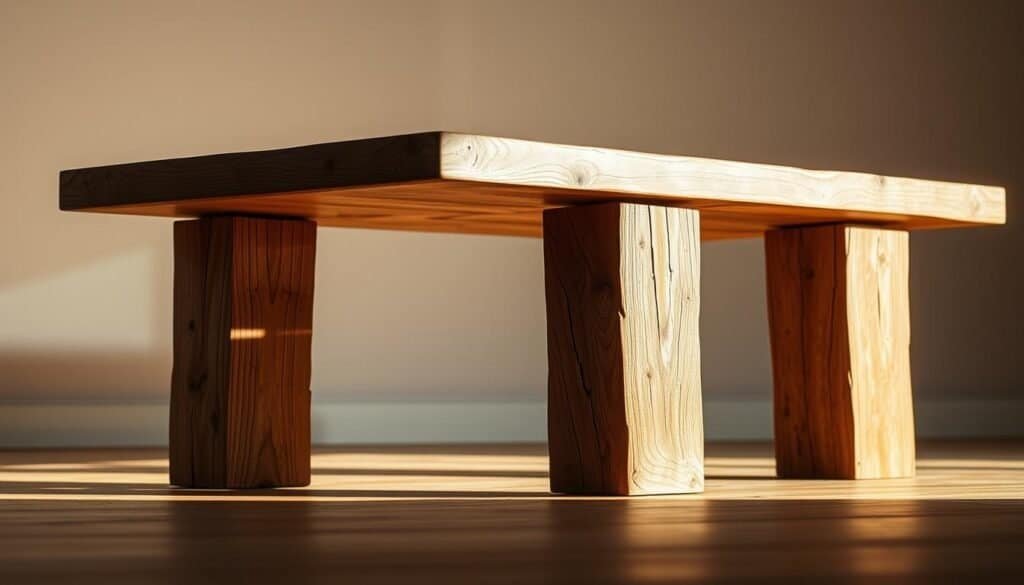
A four-post design is a timeless choice for coffee tables. It has four legs, one at each corner, for a strong base.
X-Frame Support
The X-frame support adds elegance and strength. It’s two supports that cross, forming an ‘X’, spreading the weight evenly.
Hairpin Legs for Modern-Rustic Look
Hairpin legs give a modern-rustic vibe. They are sleek and minimalist, adding an industrial chic to your table.
Cutting and Preparing Leg Material
After picking your leg design, cut and prepare the material. Accurate measuring and precise cutting are key for uniformity.
Creating Uniform Legs
Legs should be the same for a balanced look. Use a template or jig for identical legs. Sanding smooths out any rough edges.
By focusing on a strong base, you make a modern rustic coffee table that’s both stunning and lasting. The leg design, whether four-post, X-frame, or hairpin, is vital. Well-made, uniform legs mean a solid wood coffee table that lasts.
For a rustic wooden coffee table, add natural elements to your legs. This brings out the table’s organic feel, making it a standout in your living room. An organic modern coffee table mixes wood’s natural beauty with modern design, creating a perfect balance.
Assembly Techniques: Joining the Top to the Base
Now that your table top and legs are ready, it’s time to join them together. Assembling your modern wooden coffee table needs careful thought. You must choose the right fasteners for a sturdy and durable table.
Deciding on the right fasteners is a big step. The fastener you pick depends on your table’s design and the wood type.
Table Top Fasteners
Table top fasteners are made for attaching the top to the legs or base. They create a strong bond, keeping the table top stable over time. These fasteners are perfect for a light wood coffee table, keeping it strong without losing its beauty.
Screws and Bolts
Screws and bolts are classic choices for building your coffee table. When using screws, always predrill holes to prevent wood damage. Bolts add extra strength and can be paired with screws for better stability.
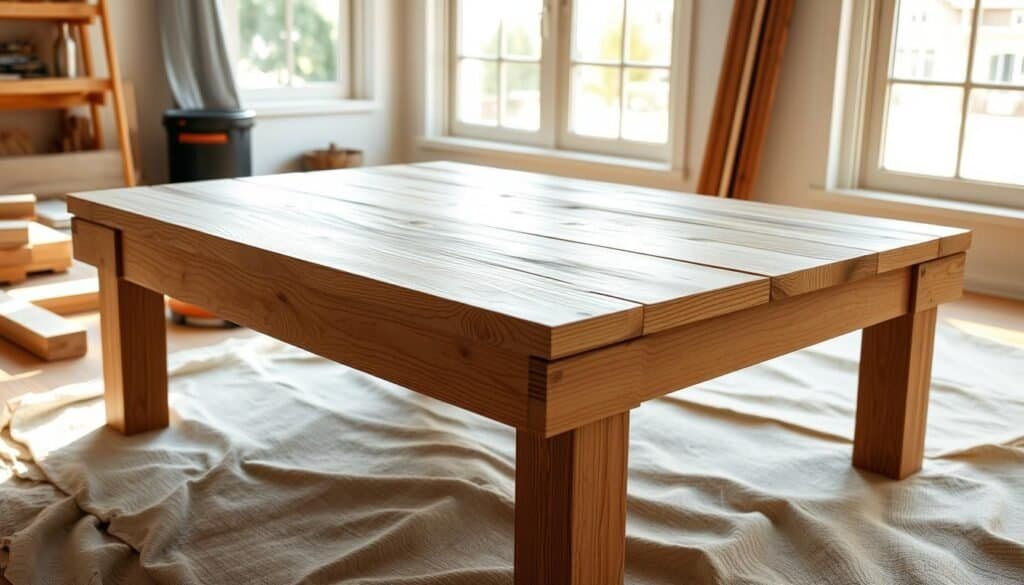
It’s important to make sure your coffee table is assembled securely and level. This makes it more functional and durable, lasting longer.
Sanding and Preparing for Finish
The sanding process is key to a perfect wooden coffee table design. Before adding any finish, sand your table to get a smooth surface. This step removes any flaws.
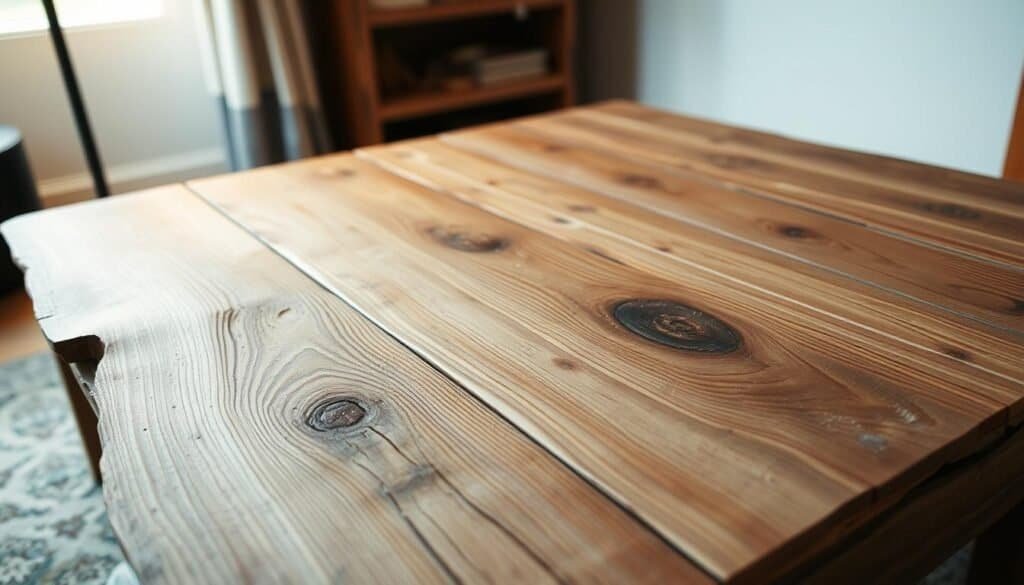
Sanding makes your coffee table look better and last longer. A smooth surface helps the finish stick well. This makes your table look like it was made by a pro.
Grit Progression
Begin with coarse grit sandpaper (about 80-100) to remove big flaws. Then, switch to finer grits (120-150) for a smoother finish. Finish with a very fine grit (220-240) for a silky look.
Hand vs. Power Sanding
Power sanders are fast, but hand sanding is needed for corners and an even finish. Using both methods gives the best results for your wooden coffee table designs.
By sanding your handmade coffee table well, you’re ready for a beautiful finish. This will make your table both durable and attractive.
Finishing Options for a Rustic Look
The finishing process is key to bringing out the rustic beauty of your handcrafted coffee table. A good finish can highlight the wood’s natural texture and add character to your DIY coffee table.
For a rustic look, you have several finishing options. Polyurethane, wax, and oil finishes are popular for rustic furniture. Each option gives a unique look and protection for your coffee table.
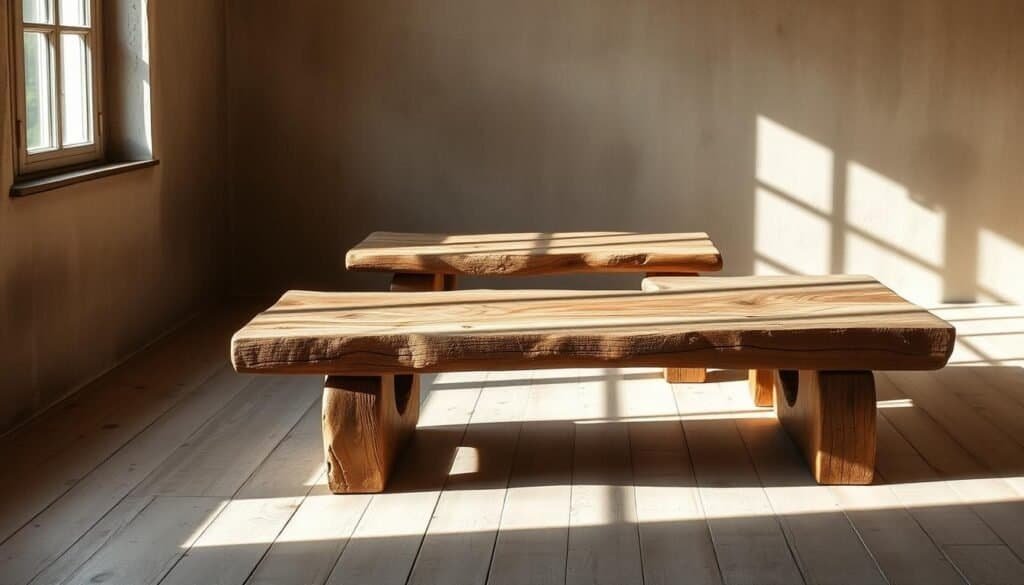
Polyurethane is a versatile finish that makes a hard, durable surface. For a rustic look, apply it with a rag or foam brush for a textured finish. Always follow the manufacturer’s instructions for application and drying times.
Wax and Oil Finishes
Wax and oil finishes give a more natural look and feel. They go into the wood, making the grain and texture stand out. A wax finish can give a soft sheen, while oil finishes like tung or linseed oil offer durability and a rich patina.
It’s important to prepare your surface before applying any finish. Make sure your rustic coffee table is sanded smooth. This will help you get a professional-looking result for your rustic coffee tables.
By choosing and applying the right finish, you can turn your DIY project into a stunning piece of furniture. It will add warmth and character to any room.
Adding Character: Rustic Details and Embellishments
To make your handmade coffee table special, think about adding rustic details and embellishments. These touches can make your custom coffee table a standout in your living room.
Rustic details can be simple textures or complex designs. Wood burning is a great way to add a personal touch. It lets you create unique patterns or designs on your live edge coffee table.
Wood Burning Basics
Wood burning uses a heated tool to burn designs onto wood. It’s easy to start with, but takes practice to get better. Begin with simple designs and then try more complex ones as you get more confident.
Simple Carving for Beginners
Carving can also add rustic charm. Beginners should start with basic tools and simple designs. You can carve patterns, shapes, or even monograms into your coffee table, making it uniquely yours.
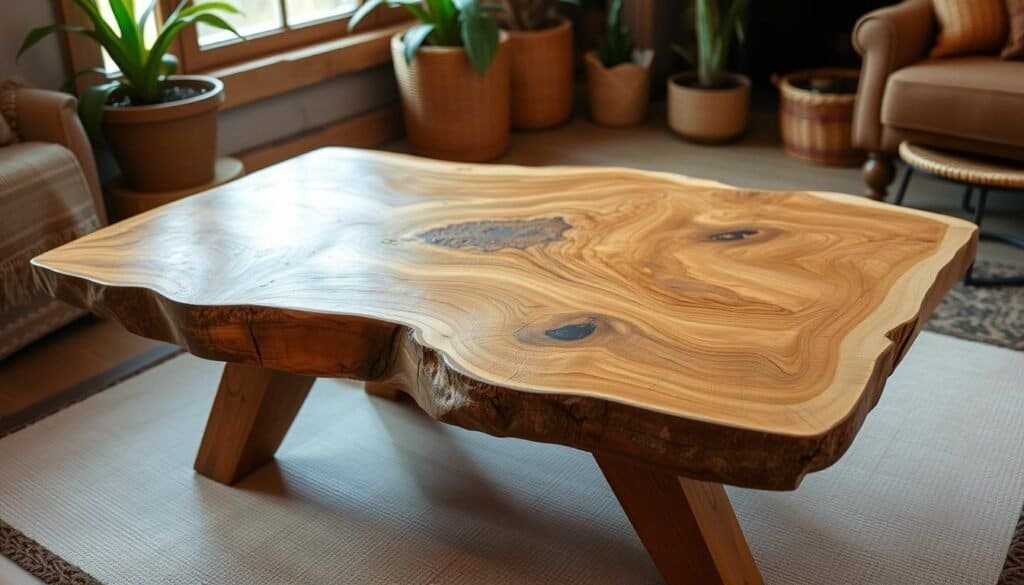
Nail heads and studs can also decorate your coffee table. Use them to make patterns or as accents along the edges. This method is simple and can greatly improve your handmade coffee table’s look.
Adding these rustic details and embellishments can turn your coffee table into a unique piece. Whether you choose wood burning, carving, or nail heads and studs, your table will surely catch people’s attention.
Troubleshooting Common DIY Coffee Table Problems
Even with careful planning, DIY projects like building a coffee table can run into unexpected problems. One common issue is uneven legs, which can make the table wobble. To fix this, you can adjust the legs or add shims to level the table.
Another problem you might face is gaps between the wooden planks. This can happen due to improper fitting or wood shrinkage. To solve this, use wood filler to fill the gaps and then sand the area to a smooth finish.
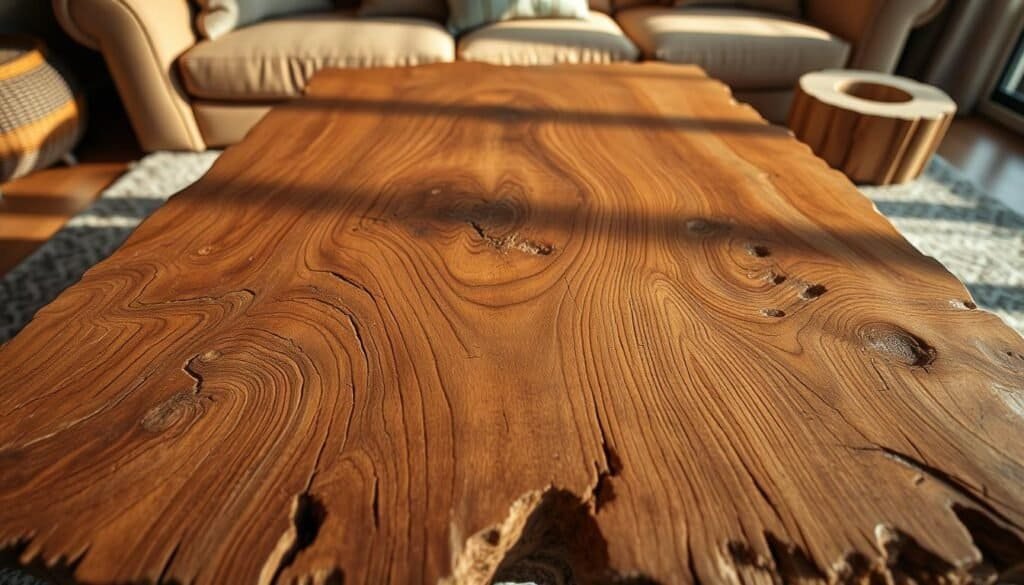
When following a step-by-step coffee table guide, you might find it hard to assemble the pieces. Make sure to follow the instructions carefully and double-check your measurements. If the pieces don’t fit, it might be time to revise your diy furniture plans.
For wooden coffee tables, wood warping or cracking is another issue. This can be prevented by properly seasoning the wood and using the right joinery techniques. Regular maintenance can also help prevent such problems.
By knowing these common issues and having the right troubleshooting tips, you can successfully complete your coffee table wood design project. Remember, patience and attention to detail are key to creating a beautiful and functional wooden coffee table.
Maintaining Your Handcrafted Coffee Table
Keeping your wooden coffee table in good shape is important. It’s not just about how it looks. It’s also about making sure it lasts a long time.
Start by dusting your table often with a soft, dry cloth. This stops dust and dirt from building up. For a deeper clean, use a gentle wood cleaner that matches your table’s finish. Stay away from harsh chemicals or rough cleaners that can harm the wood or remove the finish.
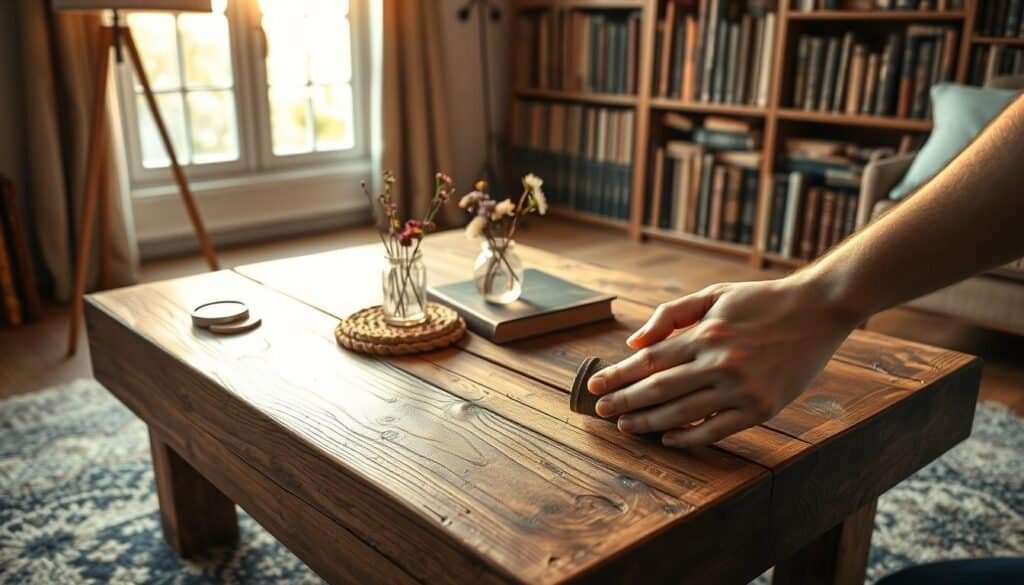
Polishing your table now and then can keep it looking great and protect the wood. Pick a polish that fits your table’s finish and follow the directions. Also, use coasters and placemats to guard against spills and scratches.
By following these easy care tips, you can enjoy your handcrafted coffee table for many years. Taking good care of it will keep it looking its best. It will also make sure it stays a valuable part of your home’s decor.
Styling Your New Rustic Coffee Table in Your Home
Your new rustic coffee table is more than just furniture; it’s a centerpiece waiting to be styled. As you bring your living room together, think about how your coffee table can be both useful and beautiful.
When styling your coffee table, finding the right balance is key. You want it to be a cozy spot for drinks and snacks. But it should also look good.
Balancing Function and Aesthetics
Start by picking a few decorative items that show off your style, like vases, candles, or trays. Then, add the things you need for everyday use, like coasters and a remote tray. Mixing these elements thoughtfully creates a space that’s both welcoming and stylish.
Seasonal Styling Ideas
To keep your coffee table looking fresh, update its decor with the seasons. For fall, add warm candles and a vase with dried leaves. In winter, bring in evergreen branches or holly for a touch of the outdoors. Simple changes with the seasons keep your coffee table decor current and engaging.
By carefully styling your rustic coffee table, you can make it the heart of your living room. It will enhance the whole feel of your home.
Conclusion: Enjoying Your Handcrafted Masterpiece
Finishing a rustic coffee table is a big deal, and you should be proud. Making something with your own hands is special. Enjoying your handmade furniture is very rewarding.
Your new rustic coffee table shows off your creativity and skill. It adds warmth and character to your home. The rustic details and embellishments will start conversations and create memories.
Completing the coffee table starts a new chapter in your home’s decor. Every time you look at it, you’ll feel a sense of pride. This shows the value of making things by hand.
Now, it’s time to relax and enjoy your handcrafted coffee table. It’s ready to be the heart of your living room. It will provide a warm and inviting space for years.

